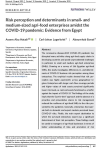Abu Hatab A., Lagerkvist C.-J., Esmat A. (2020). Risk perception and determinants in small- and medium-sized agri-food enterprises amidst the COVID-19 pandemic: evidence from Egypt. Agribusiness, 01/12/2020, vol. 37, n. 1, p. 187-212.
https://doi.org/10.1002/agr.21676
https://doi.org/10.1002/agr.21676
| Titre : | Risk perception and determinants in small- and medium-sized agri-food enterprises amidst the COVID-19 pandemic: evidence from Egypt (2020) |
| Auteurs : | A. Abu Hatab ; C.-J. Lagerkvist ; A. Esmat |
| Type de document : | Article |
| Dans : | Agribusiness (vol. 37, n. 1, Winter 2020) |
| Article en page(s) : | p. 187-212 |
| Langues : | Anglais |
| Langues du résumé : | Anglais |
| Catégories : |
Catégories principales 09 - ENTREPRISES ; 9.1 - Entreprise généralités (gestion, organisation)Thésaurus IAMM PME ; COMMERCE ; INDUSTRIE ALIMENTAIRE ; COVID-19 ; CHAINE D'APPROVISIONNEMENT ; GESTION DU RISQUE ; GESTION DE LA CHAINE LOGISTIQUE ; LOGISTIQUE ; PREVENTION ; GESTION DE L'ENTREPRISE ; PAYS EN DEVELOPPEMENT ; EGYPTE |
| Résumé : | The coronavirus disease-2019 (COVID-19) pandemic has disrupted many activities along agri-food supply chains in developing countries and posed unprecedented challenges in particular to small and medium agri-food enterprises (SMEs). Drawing on a survey of 166 Egyptian agri-food SMEs, this study investigates differences in- and determinants of COVID-19 business risk perception among these enterprises. The empirical results showed that risk perception was highly asymmetric across geographical regions. Enterprises with longer cash flow coverage periods and higher values of total assets perceived significantly lower risk levels, as cash and assets functioned as a buffer against the impact of COVID‐19. The findings of the study imply that the “just-in-time” approach and the absence of a proactive and preventative stance to risk management reduced the resilience of agri-food SMEs to the risks presented by the pandemic. Generally, enterprises that operate both in domestic and export markets perceived lower COVID-19 risks. Finally, the main export destination to which the surveyed enterprises export was a significant determinant of their risk perception. These findings could be useful to managers of agri‐food businesses in terms of better understanding of risks and promotion of risk management practices. More so, they can help design effective policy interventions to mitigate the impacts of the pandemic on Egyptian agri-food SMEs and build up their resilience to future pandemics and shocks. |
| Cote : | En ligne |
| URL / DOI : | https://doi.org/10.1002/agr.21676 |







